Tuesday, September 26, 2006
ORSON SCOTT CARD ESSAY ON HOMEWORK
I just read a great article by Orson Scott Card about homework. I know, I know, it sounds just totally interesting to you, and you can hardly wait to read it. Would it help if I told you he's kind of anti-homework?

Here's the link.
My favorite paragraph:
Here's another reason some teachers hate homework -- and stop assigning it: Their own kids reach school age and start having to spend hours a night doing meaningless assignments. Both books record this phenomenon. Teachers who are also parents become quite skeptical of the value of homework when they see how it steals time from and ruins their relationships with their children.
Anyway, if you've got time you should check it out
Jay
Sunday, September 24, 2006
HOW TO MAKE A 'BUMP KEY'
I originally saw this on Marshall Brain's blog. But since I'm going hog wild putting video up on this site I thought I'd just post the video here. You have to admit this is cool! This video shows how to make a key that will open any lock using that particular blank. I haven't gone to the effort to make one of these. One of these days...
Anyway here's the video.
Have a nice day
Jay
ONE REASON WHY VANILLA ICE WENT DOWN IN FLAMES
I'm having a great time checking out youtube.com and finding cool videos to embed into this blog. Remember in a previous post I told you that the reason Vanilla Ice became uncool was because he was trying too hard to be cool. Vanilla! Just chill dude. Quit trying to convince everyone you're cool. We like you!
Well maybe Jim Carey also had something to do with it.
Favorite line:
What's your real name? Robert VanWinkle.. Why did you change it? Cause nothin rhymes with Winkle!
Later
Jay
ROBOTS
Okay, I was going to post this last night, but I got sidelined. I figured out how to embed videos onto these posts, and I went back and found a bunch of videos and embedded them in previous posts.
Then I got sidetracked watching clips like this one from the greatest sitcom ever: "The Office"
I never claimed to be a perfect person Samuel. I don't have perfect focus. I can't raise or lower my cholesterol at will.
Anyway, I haven't forgotten about some of those links. Don't take this seriously, but when I read it I thought it was pretty cool.
http://marshallbrain.com/robotic-nation.htm
You can find all the rest of the links from the link above.
Later
Jay
Thursday, September 21, 2006
MORE REASONS TO GET GOOD GRADES
Nice talking to you today, happy birthday by the way. Sorry we had to cut our conversation short. I was trying, unsuccessfully to get my boarding pass for a flight on AirTran airlines, and they had to help me out at the desk for like, 20 minutes and when I called back the line was busy.
Thanks for the feedback from this site. I was actually surprised that the post suggesting ways to study was your favorite one. I assumed that the business idea posts would have been your favorite ones. But that’s just me, I was so obsessive about money at your age. I don’t know why.
But I’m glad the study suggestions were interesting to you because good grades are important. A lot of people will tell you that they’re not so important, but those people are wrong. Only one person in my entire childhood communicated to me that I should get straight A’s. Uncle Lowell. He got  out Barbara’s report card, and showed it to me. He pointed out that all her grades were A’s, and told me that Barbara always got straight A’s. “There’s no reason why you shouldn’t get grades like this.” One time I spent a week at their house when Mom and Dad went on a cruise and I was kind of surprised that they expected me to sit down and do my homework. When I was frustrated with doing my Algebra, one of the older cousins sat down and helped me through it. That rarely if ever happened to me as I grew up. Dad used to say that grades were a big joke and you pretty much have to jump through hoops to get them. He was right about that. Unfortunately I concluded that it wasn’t important to jump through the hoops. If I would have jumped through the hoops back then I would have it a lot easier in college. It is important to get good grades.
out Barbara’s report card, and showed it to me. He pointed out that all her grades were A’s, and told me that Barbara always got straight A’s. “There’s no reason why you shouldn’t get grades like this.” One time I spent a week at their house when Mom and Dad went on a cruise and I was kind of surprised that they expected me to sit down and do my homework. When I was frustrated with doing my Algebra, one of the older cousins sat down and helped me through it. That rarely if ever happened to me as I grew up. Dad used to say that grades were a big joke and you pretty much have to jump through hoops to get them. He was right about that. Unfortunately I concluded that it wasn’t important to jump through the hoops. If I would have jumped through the hoops back then I would have it a lot easier in college. It is important to get good grades.
Why is it important for a person like yourself to make the extra effort to get good grades?
good grades?
The same reason it is important for you to get your Eagle Scout. People constantly evaluate each other based on different criteria. One way adults (who rule the world) evaluate teenagers is by their grades. If you have straight A’s, it says that you are bright enough, and hard working enough, with enough initiative to successfully work within a system (like the school system). If you have really good grades it doesn’t mean you’re the smartest person in the school. It means you show up, you do a good job, and you’re consistent. If you can do those things you’ll be successful at pretty much everything you set your mind to doing.
I have some friends who I’ve invited to participate in this blog. All of them are more qualified than I am to describe what it takes to be successful academically in school. Of course they’re all very busy people. But one of these days one of them will chime in with a different point of view.
Anyway, I’ll talk to you later.
Jay
ALTERNATIVE ENERGY - CERAMIC BATTERIES
In the next several years, our society has a lot of tough problems to tackle. One of those
 problems is the need for clean, sustainable energy. Probably the toughest energy sector is the transportation sector where individual cars dominate the landscape. Some people think it may turn into a big problem for us, some don't.
problems is the need for clean, sustainable energy. Probably the toughest energy sector is the transportation sector where individual cars dominate the landscape. Some people think it may turn into a big problem for us, some don't.Here is a link describing a cool technology developed to tackle that problem (Hat tip to R-Squared):
http://money.cnn.com/2006/09/15/technology/disruptors_eestor.biz2/index.htm
These guys supposedly have developed a new kind of battery made out of ceramic materials that can hold huge amounts of electrical energy, and re-charge in just a few minutes. If this is a real technology there is little doubt that it would take over the market in a big way, very quickly.
Actually, technically it isn't a battery. It's an ultracapacitor. Whenever something new like this is announced, my first reaction is to be skeptical. But if it is real, it will change the world.
Jay
Wednesday, September 20, 2006
HOW TO SAVE MONEY ON A FUNERAL
Remember the 5 year rule? This post can go in the category of things you won't really need to know for years. But knowledge is power. Several times in your life you will make a purchase involving thousands of dollars. When you buy a car, a house, or go to college, those decisions will affect your wallet big time. If you have a few pieces of useful knowledge going in to each of these situations you will get ahead financially. Today I will show you how to save thousands of dollars when paying for a funeral.
We do a lot of things in society because we take the advice of experts who may or may not have our best interests at heart. This is definitely illustrated by our American funeral customs, which have been largely put together by people who need to make a living doing these particular jobs (morticians). Putting together your loved one’s funeral arrangements will be an emotionally-charged, difficult process, but for the funeral director it is literally "just business." Because it is such an emotionally charged time, people make emotionally based decisions that can cost a lot of money. According to this website, the average funeral costs between $6000 - $8000. Why so much?
To illustrate lets look at the single most expensive line item in the cost of a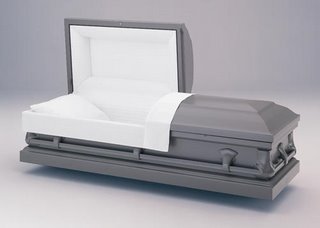 funeral - the casket. If you take a look at the different caskets with different price points you will notice that the less costly caskets are designed to look cheap. The interior cloth looks cheap, the paint looks cheap, notice the caskets have fixed handles that are so close to the side of the casket that the casket becomes difficult to carry. The cheap looking casket cost the mortician $400 and he sells it for $1200-$2000. But most people take one look at it and say to themselves - I don't want the brown casket; that casket looks cheap. Again, the less expensive caskets are designed to look cheap and ugly.
funeral - the casket. If you take a look at the different caskets with different price points you will notice that the less costly caskets are designed to look cheap. The interior cloth looks cheap, the paint looks cheap, notice the caskets have fixed handles that are so close to the side of the casket that the casket becomes difficult to carry. The cheap looking casket cost the mortician $400 and he sells it for $1200-$2000. But most people take one look at it and say to themselves - I don't want the brown casket; that casket looks cheap. Again, the less expensive caskets are designed to look cheap and ugly.
Well, the more expensive casket does look better. It has nicer paint, probably with a layer of clear  coat. It might be thicker metal. The cloth isn't a cheap paper-mache, but an actual fabric, or even maybe a velvety cloth. The handles are swing style, so they are easier to pick up by the pall bearers. The "upgrades” cost the manufacturer another $150; the funeral director maybe pays $750 for the casket, and you pay $3850-$4500. But the only thing the consumer thinks of is: "I want the blue casket; Uncle Fred will look nicer in that one."
coat. It might be thicker metal. The cloth isn't a cheap paper-mache, but an actual fabric, or even maybe a velvety cloth. The handles are swing style, so they are easier to pick up by the pall bearers. The "upgrades” cost the manufacturer another $150; the funeral director maybe pays $750 for the casket, and you pay $3850-$4500. But the only thing the consumer thinks of is: "I want the blue casket; Uncle Fred will look nicer in that one."
But if you ask 100 people, 90 of them won't be able to tell you what color the casket was at the last funeral they attended. Seriously, ask yourself that question. Do you remember what color the casket was at the last funeral you attended?
So people pay an extra $2000 for what? It’s an emotional decision. “I want the blue casket.”
Similar price hikes are built into every emotional decision made when arranging funerals. To avoid sunken graves, the cemetery requires something to protect the casket.
A grave liner ($200) does the job, but most people (with suggestion from mortician) want the casket to be ‘protected’ so they will buy the
the
Grave Vault ($450) that will completely surround the casket, but water might get in so they buy the Sealed Grave Vault ($750) but it looks so ugly I will upgrade to the stainless steel lined sealed grave vault ($1250), or the bronze sealed grave vault ($1950).
Who has been to a funeral and thought to themselves, "I wonder what kind of vault the person bought?" That would be tacky and tasteless, but someti mes people are sold the sealed grave vault for $750, or the copper lined sealed grave vault for $1950 as if it would be tacky and tasteless to NOT buy something nice for a deceased person whom we love. Where is the value here? The difference in value between the $200 grave liner, and the $1950 bronze vault resides entirely in the mind of the consumer. Both items do the exact same job (keep the dirt from crushing the casket) but one costs $1750 more. Wouldn’t you rather fund a Roth IRA with that money?
mes people are sold the sealed grave vault for $750, or the copper lined sealed grave vault for $1950 as if it would be tacky and tasteless to NOT buy something nice for a deceased person whom we love. Where is the value here? The difference in value between the $200 grave liner, and the $1950 bronze vault resides entirely in the mind of the consumer. Both items do the exact same job (keep the dirt from crushing the casket) but one costs $1750 more. Wouldn’t you rather fund a Roth IRA with that money?
Speaking of grave vaults, some people are genuinely grossed out by the thought of water getting into their loved one's casket. This has led to a windfall of revenue for the funeral industry thanks to sealed "protective" caskets. Getting the gasket added to a casket will generally increase the cost of the casket by $800. Most consumers go for it. Casket manufacturers add in guarantees of just how protective the casket is. But wood caskets are inherently non-protective (for the record, wood caskets cost the funeral home $850-$1400, and sell for $4000-$9000) so if you buy a wood casket, chances are you'll be offered a protective "sealed" vault. The seal on the vault is much stronger than the seal on the casket and only costs an extra $300 usually. So if you get grossed out by the thought of water or bugs getting into the grave, the protective vault is the way to go; get a casket without a seal on it and save yourself the $500.
Basic services fee. Every funeral home charges a basic services fee, which is basically a signing bonus the funeral home gets when you do business with them. Everything else you buy has a cost next to it that you actually get something for. The basic services fee is a charge for nothing. But there is a huge disparity from mortuary to mortuary on how much is charged for this basic services fee. I've seen them as low as $400 and as high as $4000. Who has the time or the inclination to compare prices between funeral homes? Not very many people compare prices between funeral homes, but the ones that do can save $3500. How many hours would it take flipping burgers to come up with an extra $3500?
The bottom line is that your mortician, no matter how nice, has every incentive to increase the services he provides so that he or she makes more money. The mortician is NOT on your side. Repeat, the mortician is not on your side. During the particularly emotional time after a family member dies, even the most thrifty consumer who clips coupons, and drives an extra two miles to save a nickel per gallon of gas, will make emotional, expensive decisions in a few moments that will cost hundreds or thousands of dollars extra. It's as simple as saying "I want the blue casket."
What can be done about this? I will walk you through a scenario that I would consider.
My loved one is nearing death.
1. Buy a burial plot at the chosen cemetery. $800 (Might have to shop around some)
2. Discuss with my loved one how they want to be remembered by the living (incidentally, this is not a bad idea for family night every year in January. Go around and ask everyone in the family how they want everyone to remember them when they're gone - not a bad way to help a teenager see life with a longer perspective.)
3. Look around unhurriedly for a funeral home with a low basic services fee. Funeral homes are required by law to give out a copy of their itemized prices to anyone who asks.
4. Set aside $6000 - $8000 in a savings account like ING direct. No need to pre-arrange and let the mortician keep all the interest on YOUR money.
5. When the death occurs, call the funeral home, arrange for an immediate direct burial in the least costly casket, and the least costly burial vault or grave liner. No need for embalming, no need for a fancy song and dance in choosing the casket, or agonizing on what kind of flower arrangement Uncle Fred would have liked best. No need for limousines or a police escort etc... Direct burial is an absolutely no-frills burial service.
6. Before burial (which is going to happen almost immediately) close family members or friends will help dress the body in final resting clothes. Everyone I know who has done this considers it an almost sacred act of service for a loved one, compared to what is easy to imagine as a gross, creepy experience before actually doing it.
7. A week, two weeks, or a month later, after unhurriedly gathering family and friends together, after gathering the important artifacts of this person's life together, like the pictures, or videos or whatever. Everyone meets at the church, or some other gathering place, and we have a tribute to our loved one's life, their victories and defeats. For people we love, it takes a long time to really go through the grieving process, and putting together a true life tribute is extremely cathartic and healing. In my opinion it is unbelievably superior to the hurried, franchised way we traditionally do funerals in this country.
There is no need for limousines. No need to pay a mortician hundreds of dollars to wheel the casket in and out of the building. No need to use the funeral home's facilities. There is no need at any point in this process for anyone to feel any shame for not choosing the casket Aunt Janet ‘would have liked best’. All of those trappings are put there, for a handsome fee, by the funeral industry to increase their profits, rather than facilitate the grieving, healing process after losing a loved one.
8. At some point in the future a grave marker (or headstone) should be purchased. You want this to look good. If there is any place in this process to splurge monetarily, in my opinion this is it. Because we will go back to see this piece of ground, the headstone should look nice. 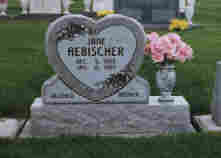
How much will all of this cost?
$800 for the cemetery lot
$1500 for the funeral
$1500 for the headstone
_______
$3800 for everything
What to do with the remaining thousands of dollars in saved funeral costs? Deploy it somehow in a way that my loved one would care about. Loan it out at Kiva.org, give it to your church, or some other cause you care about. Divide it equally among the surviving family with explicit instructions to accelerate debt payments. It really doesn't matter because most everyone would agree that anything is preferable to literally throwing our dollars in the ground. That’s what most people currently do. But now you know.
And knowing is half the battle.
WTYM
Jay
Tuesday, September 19, 2006
INDEX TO PREVIOUS BLOGS
Personal Finance Posts
23 YEAR OLD GIRL SAVES $60,000 - YOU CAN DO IT TOO
THE MCDONALDS TEST
THE ROTH IRA WAY
LISTEN TO THIS ATTORNEY
HOW TO SAVE MONEY ON A FUNERAL
JUST BUSINESS
UNCLE RICO'S GUIDE TO THE SWEET MOOLAH - SHOE SHINE BIZ
CUTE AS A BUTTON - SYNERGY IN BUSINESS
SUCCESS
THE 5 YEAR RULE
PREDICTABILITY AND CONSISTENCY
THE 80% RULE OF SUCCESS
THE 20% RULE
CHANGE THE WORLD WITH MICROCREDIT
TEENAGE LIFE ARTICLES
READ THIS ARTICLE BY PHIL GRAHAM
WHY NERDS ARE UNPOPULAR
EAGLES DON'T FLOCK
MUSIC AND MOVIES
SONGS THAT ROCK - TEENAGE WASTELAND
SONGS THAT ROCK - ICE ICE BABY
TOBY KEITH'S GREATEST HITS
FIRST OF THE GANG TO DIE
CLASSICAL MUSIC TO GET FAMILIAR WITH
COLLEGE PREP
SOMETHING TO DO NOW TO PREPARE FOR COLLEGE
EAGLE SCOUT
EAGLE PROJECT IDEAS
DO PHYSICS FIRST
Monday, September 18, 2006
23 YEAR OLD GIRL SAVES $60,000 - YOU CAN DO IT TOO
You're what, 15 years old now? This week.
Check out this girl:

http://money.cnn.com/2006/09/07/pf/saver_nixon/index.htm?postversion=2006090711
Don't tell yourself it couldn't happen to you!
Jay
Saturday, September 09, 2006
ATTORNEY SAYS YOU SHOULD PAY ATTENTION TO MY ADVICE
Yesterday I was sitting next to an attorney on the plane from NY yesterday. I was jotting down some notes on a pad of paper, and he whipped out a sudoku puzzle. I asked him to teach me how to do it and he obliged. I'll probably be addicted so sudoku forever because of it. We ended up talking for the rest of the flight. It was a great conversation. We even talked about you!
He asked me what I was writing about on the pad of paper. I told him I was writing some notesfor a blog entry on how to convince you to fully fund a ROTH IRA while you're still young and not paying taxes.
"Hmm... Well he won't appreciate the good advice for a long long time probably. But that's good advice."
"Yeah, well he's just a freshman in high school. I figure that he can ignore 95% of what everybody says, but if he does a few things right he will avoide a lot of trouble for himself. For example, I really wish I hadn't blown off the PSAT back in the day, because that put me out of the running for being a national merit scholar."
"Yeah. The PSAT is probably more important than the SAT. For the purposes of getting a scholarship anyway. And if you do well on the PSAT you'll do fine on the SAT."
"So you're doing this high tech blog thing for your brother, who is going to type up your chicken scratch notes later to put it online?"
"Oh, I will. I've got a laptop right here, but sometimes it's just easier scratching out ideas on a notepad."
"Well, it's a good idea. I have a 13 year old son. I wouldn't have let him blow off the PSAT in a few years, but I hadn't thought of the ROTH IRA idea. That's a good idea."
"Yep, I'm full of good ideas."
later
Jay
DO PHYSICS FIRST
There is little question that many of the career paths with a good future are in the hard sciences. Understanding higher math, logic, sciences, and being a good writer will qualify you for jobs you can't imagine now.
There is a bit of disagreement as to what sciences should be taught first. In my opinion this is the sequence to take science classes in high school. If possible for you.
Physics - where you learn about the 4 forces that make up the rules for the physical world, and the historical approaches taken to solving these problems.
Chemistry - How 2 of the 4 forces that rule the physical world specifically affect how atoms combine and recombine to form chemicals that we are familiar with.
Biology - How the combining of chemicals works inside our body to give us energy, and make our bodies work. How chemical reactions take place in other living things as well.

Physics is the gateway science that starts you on the path to learning the other ones better. By far, Biology is the discipline we understand the least, because it is basically physics and chemistry combined into very complicated problems to be solved. Of course you'll have to go back to physics later when you have more math under your belt, but the point is, that the other subjects will be more interesting if you have the basic rules of how the world works in your head, and you learn those basic rules in physics.
Here is an article that describes why you should take physics first.
Here is an article that talks about the dual nature of light we were talking about the other day.
Here is a series of articles on electricity.
Okay, talk to you later
Jay
CHANGE THE WORLD WITH MICROCREDIT
Here's a link to a website called 'Kiva'. Whoever is putting this together is a smart dude. It's a website that matches up lenders to borrowers of microcredit loans. I don't know that it's possible to make this a truly large scale project, but it's a great website to go to if you're interested in learning what kind of things people need for microcredit loans.
I've checked out this site. It's great. Have you seen those commercials about how you can feed a child for as little as 29 cents per day? This is kind of like that. You can actually make a micro-loan to a third world entrepreneur, and get paid back! This site has effectively removed the barrier to entry of changing the world. I hope you check it out.
I've added a link to KIVA link on the right hand side bar. At this point I can't figure out how to put a banner on this post.
 But here's a picture of Muhammed Yunus, the founder of Microcredit. He is the man.
But here's a picture of Muhammed Yunus, the founder of Microcredit. He is the man.Also, here is a video introducing a microcredit accelerator called Unitus.
Word.
Jay
Friday, September 08, 2006
SOME MUSIC THAT I LOVE
Dear Samuel,
I don’t know if you’ve spent much time listening to classical music. But here is a selection worth listening to.
Vivaldi – The Four Seasons
Bach – The Brandenberg Concertos
Mozart – Symphony 100, Requiem
Beethoven – All symphonies – especially 5, 6, and 9. The Eggmont Overture, and his Piano Sonatas
Dvorak – Cello Concerto,
Felix Mendelsson – Violin Concerto in E minor
Aaron Copland – everything, but especially Rodeo (The beef song)
Gershwin – Rhapsody in Blue
Some of the best that has come out of Western culture is our fine music.
WTYM
Jay
HOW TO GET GOOD GRADES WITHOUT SPENDING A LOT OF TIME
Dear Samuel,
I thought I’d take some time today to jot down some suggestions for succeeding in school without spending more time than is necessary.
Although, talking about the public education system is something I struggle with for several reasons. First of all, I never really got particularly outstanding grades. I got decent grades. Sometimes I got good grades. But my grades never set me apart from the crowd. Some people, including Dad, told me as I was growing up that grades weren’t that important. Those people were wrong. Grades aren’t everything but they mean something, and sometimes they can mean a lot. People judge us by all sorts of criteria, and grades will be one of the things you get judged on for the foreseeable future. I struggle giving advice in this area because for varying reasons I never got outstanding grades.
Second. I am not a teacher. Some of my friends (who I respect a great deal) have gone into public education as teachers. I don’t want to say something that would be interpreted as cynical toward this profession.
With that said, I do have some suggestions that might help you.
Suggestion 1
Don’t wait until you get home to do your homework. The best possible place to do the majority of your homework is AT school. I know for a fact that most courses won’t assign so much homework that you need to be swamped with hours of homework to do at home. What do you do during lunch? Find someone who is smart and has some of the same classes as you and spend 15 minutes of intense thought at lunch banging out your algebra homework. What are you doing during your down time? A lot of kids spend this null space torturing each other. Don’t participate in that nonsense. Sit by some smart kid and knock out your social studies homework. You get the picture. Extra credit for making your math buddy one of the cute girls in class. I got an A in Geometry because I sat in front of Kristina K in that class. We made it our life’s mission never to take home a single geometry assignment, and to always finish it at school. For the most part we did, and we were always friends after that. And she was one fine babe. (whistle)
Suggestion 2
What do you do when you’re typing up something in Microsoft Word and you have to call it quits for a while? You push on the save button right? Otherwise you’ll have to type it up again later, and that’s not for you. You need to have a mental ‘save’ button that you use at the end of every class period in school. Everybody else puts their books in their book bag 2 minutes before class ends. You aren’t going to do that. You’ll spend that 2 minutes mentally reviewing what you just went over in class. Put it on a shelf in your brain in some organized way. When you arrive to that same class the next day you open your book and boot up your brain to learn the subject matter by mentally reviewing AGAIN what you reviewed when you hit the save button at the end of class the day before. Don’t be a nazi about taking notes. Take good notes, but focus on paying attention and organizing the material in your brain in some sort of recognizable pattern as you’re learning it during the class period. To summarize, each class period should go like this:
Boot up
Pay attention in class
Save and close
Go to the next class
If you follow the process, then studying will be a lot more natural, fast, and easy. You’ll find you don’t have to cram when it is time for a test. You’ll also notice that you remember the material for a lot longer.
Suggestion 3
Assemble a study team. For me, this was especially important for math classes. You need to get in a position where you are with people working on the same problem, and you know the material well enough to explain it to someone else in the group.  A rule of thumb is you don’t understand the material if you can’t explain it successfully to somebody else who is trying to learn it. You’ll also find that if you teach the material to somebody else, you can remember it a lot better. But it also helps to have somebody nearby who understands just in case you don’t understand how to work through the problem.
A rule of thumb is you don’t understand the material if you can’t explain it successfully to somebody else who is trying to learn it. You’ll also find that if you teach the material to somebody else, you can remember it a lot better. But it also helps to have somebody nearby who understands just in case you don’t understand how to work through the problem.
Suggestion 4
It is hard to overstate the importance of becoming good at writing when you’re in school. There is only one way for this to happen. You need to practice putting your ideas down on paper, and you need to practice re-writing. Here’s a fact. There aren’t that many good writers out there. Most anyone who’s writing approaches half decent is actually a good re-writer. In order to improve your writing you have to write, and re-write as much as possible. If you want to get good grades on writing assignments you have to re-write your material at least a couple of times. Don’t despair, it takes work, but you will get better. Anytime you get a writing assignment you need to bang out the writing assignment as early as possible. Just get it down on paper. Then depending on how much time you have before the assignment is due, you re-write it as many times as possible. If you have more time, you do more re-writes.
The way re-writes work is this. You get your ideas down on paper. Then you put some space between you and the writing. You go play basketball, or sleep on it. Then come back and read it out loud. Write in any corrections and re-type it. Repeat the process of creating space, then revisiting it and reading it aloud as many times as possible.
The bar is unbelievably low, so if you’re even kind of good you’ll find that you get okay grades. But don’t be surprised to see red ink on your paper taking off points and giving ideas for improvement. Think of the red ink as ways you can do better, but don’t take it personally. Anytime you are ready to turn something in, take your writing to an adult to correct it first. Go back and re-write one more time and incorporate the adult’s suggestions. I don’t claim to be a great writer, but you can feel free to email me, and I will email you back with any corrections or suggestions.
Suggestion 5
Build your own curriculum. Your teacher might be awesome but maybe he isn’t interesting to you. It’s your job to make the subject matter interesting. Go find a magazine article, or an interesting book, or a NOVA documentary on the subject you’re learning about. Don’t go overboard and neglect your homework. Remember that grades do matter. But it’s a wide world out there. There is a lot of cool stuff and you don’t need to be confined to some educator’s curriculum. If somebody suggests a good book to read, go check it out from the library. Just give it a try, you’ll be surprised at how much cool stuff there is out there.
Well that’s all there is for now. And my plane is about to land. So I’m signing off…
Jay
Thursday, September 07, 2006
EAGLES DON'T FLOCK
Dear Samuel,
Ross Perot is one of my favorite Americans. I actually met him in person a few months ago. I was in the lunch line at a food establishment where Ross was eating and Ross cut in front of me in the lunch line. I stood there just staring at him thinking “Wow, that’s Ross Perot! Right in front of me!” He looked over at me, waved and said: “Sorry.” Then got his lunch.
To be fair I was eating lunch at Perot Systems, and Ross basically owns the company. He can cut in line anytime he wants and I honestly didn’t mind.
When Ross started his first company – EDS – he had a slogan he used to inspire the Human Resources people to attract talent. He didn’t want them just going to Harvard and hiring any old person in the top 5% of the class. He wanted them to find qualified candidates who would deliver top notch service day in and day out. Mr. Perot came up with a slogan he used and repeated often. “Eagles don’t flock. You have to find them one at a time.” You can’t go far at Perot Systems without seeing that slogan somewhere plastered onto a statue of an Eagle flying majestically. There are pictures of eagles flying majestically, and statues of eagles flying majestically throughout the building.
There’s this one HUGE statue of an eagle. It is mounted to a base the size of a Volkswagen Beetle. The Eagle probably has a wing span of 8-10 feet. On it there is a plaque that says the statue was given to Ross Perot on his 75th birthday by his son Ross Jr. The slogan on this particular statue says “Eagles don’t flock. They team.”
Before I die I want to know what that slogan means. Do eagles really team? Is it just some sort of dumb slogan vacuous of meaning? Or is it a real slogan rife with meaning that I just can’t understand?
I’d like to know.
Jay
Wednesday, September 06, 2006
EAGLE PROJECT IDEAS
Dear Samuel,
Hope you had a good long weekend. I know I did. Now all I need to do is get a job with the federal government so I can get even more holidays off from work, as well as a sweet defined benefit pension plan.In a previous post I mentioned that you should strive to get your Eagle Scout badge sooner than later. It is definitely a good idea to get this out of the way before you get your drivers license.
I don’t know if I ever told this to you, but here’s a true story. Grandma and Grandpa had a celebration / get together for their fiftieth wedding anniversary. All the cousins got together, the Aunts, and Uncles and everyone was gathered together in a church gymnasium. Grandpa was making the rounds, came up to Shawn and Me, put his hands on our shoulders, asked us how we were doing, and told us he wanted us to get our Eagle Scout badge. Grandpa had been heavily involved in Boy Scouts for years, and had even won the Silver Beaver award. I don’t know what the Silver Beaver award is, but it must have been important because scout guys talk about it like it’s a big deal. Anyway we had the fiftieth anniversary banquet, and in the middle of a slide show showing pictures of the family going way, way back Grandpa had a heart attack, went to the hospital and died; so technically Grandpa’s dying wish for me was for me to get the Eagle Scout award. I was one of those Eagle Scout recipients who earned the Eagle badge a matter of days before my 18th birthday. I speak from experience that it is a big hassle earning your Eagle Scout badge after age 16. I had to make it a priority, which was why I decided my Senior year not to run track, and instead focus my extra time on earning the final 3 some odd merit badges. My track coach was extremely upset with me, and even called Mom on the phone to get her to talk me out of it.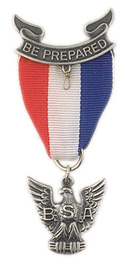
The key to a good Eagle project is organizing people. The Eagle board of review wants you to come up with some sort of project that will do some good in the world, organize people to do it, and execute the project. That’s what they want you to do.
What is sets an Eagle Scout apart from other teenagers? I think it comes down to initiative and diligence. Two things most teenagers have in common is they have no initiative, and they don’t have any follow through. There’s nothing particularly wrong with this common trait of teenagers but eventually you all will need to grow out of it. Getting your Eagle Scout sets you apart from the riff-raff. It means you’ve set your sights on a goal (the Eagle Scout award) and you followed through the required multi-step process of getting multiple merit badges, and you’ve organized yourself and others to bring about real change in the real world with your Eagle project. So as mundane as getting your Eagle Scout award may seem to you right now, let me assure you that it does mean something from an adult perspective and how you are perceived as a teenager.
I haven’t really talked to you about what merit badges you have left before you’re finished with your Eagle Scout. That’s a conversation for another day. This post is intended to suggest a couple of possible Eagle project ideas. Take them or leave them.
Organize a
This is an Eagle Project I’ve seen done that I have mixed feelings about. All you have to do is find some group of adults who can donate blood, and organize the adults and the Red Cross to get together somewhere so the adults can donate blood. This is an example of a very easy Eagle project. You basically just have to contact the Red Cross, obtain a building for the blood drive – like a church building, or a school, or some other location. Then you just ask a group of adults (it could be adults in your neighborhood) to come and donate blood. The Red Cross will do most of the work. You mainly need to organize the details.
The Eagle board of review will want to know how many man hours went into organizing this project. You’ll need to keep track of all the hours you spend organizing it, as well as the time spent by your volunteers. Then you need to write a summary of your project, put it all into a binder and submit it for review. At that point they’ll call you in and you’ll be interviewed by some high level Scout guys. They’ll either tell you that you did a good enough job, or they’ll ask you to go back and do something else (usually they’ll have you change something in the binder you submitted). And bada bing. You’ve earned yourself an Eagle. I like this idea because the Red Cross does most of the logistical work. There’s nothing wrong with easy. What I don’t like about this idea is it somehow seems like a cop-out to me. Like you you’re outsourcing the project to the Red Cross.
Organize a Hunger Banquet
This is my favorite idea for an Eagle project that I’ve run across. What you do is you organize a banquet that raises money for some humanitarian project. My personal opinion is that any money raised should go to Unitus. But money raised could go to a local food bank, or to the Red Cross, or the
While everyone is eating you give a presentation (make sure to keep track of the hours you spent practicing for this presentation, and putting it together) on microcredit, or the benefits of the local food bank or whatever. Then invite the attendees to donate money at a website. Here is a cool tool I found to make it easy for people to donate. Then you make sure the money gets into the organization you were raising money for. Write up your report, put it in a binder, go to the Eagle Review, and you’re done.
Public Works
You might try checking with a local city official to see if there are any planned projects at local parks. There usually is something planned. Sometimes it is possible to co-opt one of these public improvement projects as your Eagle project. How it works is the city will supply the building materials for the park benches, or the park gazebo or whatever, and you organize the expertise, and the labor to put it together. You organize the labor, execute the assignment and build the park benches (or whatever) and write up the project and put it in a binder.
These are all 3 good ideas for an Eagle project. I’m sure there are other good ideas, but nothing is coming to mind right now.
Jay
Friday, September 01, 2006
SONGS THAT ROCK - FIRST OF THE GANG TO DIE
I don't know why I like Morrissey so much but I do. His songs all seem to have the same sort of general attitude under the surface that is hard to describe. It's something like the melancholy attitude you would imagine to be in the air at a convention full of high school trench coat guys.
Dude, life sucks, I hate it.
Yeah
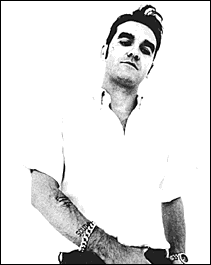
On the other hand the music has so much energy that it carries the music up to a cool level. Morrisey was the driving force behind the band "The Smiths" which brought us the cool theme song to 'Charmed'. -How Soon Is Now - an awesome song. Listen to the guitar on this song. It's got an industrial, 'you're just a cog in a giant machine' British kind of feel. And yet, there is so much energy in the music. And yet 20 years later it still sounds as cool as it did when it came out. That's the difference between good music, and crapola. Notice how lame the video is, that's because it was made back in the eighties before anyone made decent music videos.
Morrissey is also responsible for bringing the band 'The New York Dolls' back together, before their bass guitar player died of leukemia. That story is found in a great documentary 'New York Doll' which my friend N told me I needed to see. And N was right, it was a teriffic documentary. On the DVD there is a 20 minute interview with Morrissey where his the raw emotion underlying a lot of his songs.
In that interview Morrissey talks about how he decided that being a rock star was for him when he was 13 years old. He went to a New York Dolls concert, and he was totally excited. But he never got to see the concert because somebody came and announced that the concert was cancelled because the drummer had just died. The drummer had taken drugs, and two groupies put him in a bathtub full of cold water and poured coffee down his throat. The coffee suffocated him and he died. From there the Dolls just kind of broke apart as a band. You'd have thought a successful popular band wouldn't break up just because the drummer died. But the band members were basically victims of their bad behavior, were all addicted to alcohol or other drugs and just couldn't get it together. The band broke up and none of the band members really had as much success again. When Morrissey got the band back together, they had all pretty much gotten their act together. After their reunion the bass player Arthur Kane died of leukemia. In the interview I saw, Morrissey called the band a cursed band. That kind of view of the world seems to be underneath all of the melancholy music put out by this guy.
First of the gang to die is still my favorite song by Morrissey because it lacks a lot of the melancholy tone, (its still there though) and has more of the energy.
I had it on MP3 on the computer I gave to you, but it got wiped out two summers ago when it got fried and I had to replace the motherboard and hard drive.
WTYM,
Jay
WHAT IS THE MCDONALDS TEST?
In a previous post, I said that being a shoe shine guy easily passes the McDonalds test. But I never explained what that is.
The McDonalds test is my way of explaining to network marketing people why their system is a waste of time. At least once per year I am approached by somebody who wants me to join their network marketing scheme. It's either amway, or primerica, or prepaid legal, or blue green algae, or xango, or whatever. I say that for the most part network marketing doesn't pass the McDonalds test, and I have applied the McDonalds test to any possible money making idea.

To apply the McDonalds test I ask myself one simple question. "Would I make more money in the same period of time gathering recruits for Amway (or Primerica, or Xango, or Morinda, or whatever) or flipping burgers at McDonalds. Almost always the answer is flipping burgers at McDonalds.
I learned this bitter, bitter lesson the summer Dad convinced me to come home from my job as a trail guide and do Primerica. The kind way of describing this summer is that it didn't pass the McDonalds test. But every time I think of it I have to censor a stream of profanity that reaches to the moon.
 I know people who make money in these projects. I know people who make a TON of money doing stuff like the network marketing schemes described above. The vast majority of people who participate in these ventures waste a huge amount of time, and money. And that's a fact. Would you make more money working for Primerica, or flipping burgers? No contest, you'll make more money flipping burgers. If you really are interested in financial services, or insurance, or refinancing people's mortgages you'll make a lot more money working with an insurance agency, or a loan broker, or a securities dealer. All of those things are within your grasp, why would you need to do it with a network marketing company? Network marketing companies by and large are rapacious, pitiful, stupid and hollow.
I know people who make money in these projects. I know people who make a TON of money doing stuff like the network marketing schemes described above. The vast majority of people who participate in these ventures waste a huge amount of time, and money. And that's a fact. Would you make more money working for Primerica, or flipping burgers? No contest, you'll make more money flipping burgers. If you really are interested in financial services, or insurance, or refinancing people's mortgages you'll make a lot more money working with an insurance agency, or a loan broker, or a securities dealer. All of those things are within your grasp, why would you need to do it with a network marketing company? Network marketing companies by and large are rapacious, pitiful, stupid and hollow.On the other hand, if you ever are in the right position it might be a good idea to start a network marketing company. Life at the top of those things is SWEET.
So, here's a short quiz.
Does joining Amway pass the McDonalds test? - NO
Does shining shoes in an office tower pass the McDonalds test? - If you do it right - Yes
When you get older and have better opportunities the McDonalds test will become kind of irrelevant. The McDonalds test is a way of expressing the economic concept of opportunity cost. The cost of what you're doing is that you won't be able to do the best possible alternative to what you're now doing. For my friend who is a civil engineer, he has to weigh whether he should keep on drawing salary as an engineer or do something else with his time. So far he has decided that he wants to continue being a civil engineer for his day job.
Hope that helps,
Jay
THE ROTH IRA WAY
I'm in the airport, and I have time for a more lengthy post, so here goes.
I don't know if you know cousin P. I'm sure you've met him before but I doubt his face comes to
 your mind. P has no college degree, there is a good chance he never will. He'll be stuck doing certain jobs his whole life that a lot of people wouldn't want to do. P is younger than me by a couple of years.
your mind. P has no college degree, there is a good chance he never will. He'll be stuck doing certain jobs his whole life that a lot of people wouldn't want to do. P is younger than me by a couple of years.And guess what, P has more assets than I do, by a good margin. Do you know why? Because his parents basically forced him into fully funding a Roth IRA each year.
What is an IRA? - It stands for Individual Retirement Account. There are several kinds of retirement accounts. The biggest difference is between the traditional IRA (which people just refer to as an IRA), and the Roth IRA (which was more recently introduced in the nineties).
Why would anybody want to start an IRA? To answer that question I want you to imagine your life as if it were a movie and you can play with the movie as if you were watching it on video and you have the remote control to the VCR. You're watching the movie, you hit the rewind button and see your life for the last week or so. Now imagine you hit the fast forward button and watch yourself live in superfast motion as you blow through your teens, your twenties, your thirties, and keep on watching yourself until you're in your eighties. Now slow down the movie to play. You'll notice that you're walking slower, you've got some gray hair. If you look really closely you'll notice that you don't have a job, and you still have bills to pay.
Eventually all our human assets will become worthless, and we have to live off the reserve capital we've set aside along the way. That's why people save for retirement. That's where IRA's, and Roth IRA's come in. There is one simple difference between the traditional and Roth IRA's.

You put pre-tax money into a traditional IRA, and you put after-tax money into a Roth IRA. So let's say that you're a fifty year old plumber making $45,000 per year. If you put $2000 into an IRA then you would only have to pay taxes on the remaining $43,000 because the IRA donation would act as a tax deduction. If you had put that $2000 into a Roth IRA you would have to pay taxes on the whole $45,000.
There is one more difference. When you retire and start taking your money out of your traditional IRA you have to pay taxes on that money. Why? Because you didn't pay taxes on it before you put it into the IRA. So if you put your $2000 into and it grew at 8% per year for forty years it would be $43,000. With the traditional IRA you have to pay taxes on whatever money you take out of your IRA as if it were income.
When you retire and start taking money out of a Roth IRA you don't have to pay any taxes on that money. Why? Because you already paid taxes on that money. Remember you couldn't take a tax deduction. So forty years from now you get to spend all of those $43,000 without paying any income taxes on it.
That is what makes P's strategy so awesome. As long as you make less than like $10,000 per year you pay no income taxes at all. So if you have some job -say McDonalds - while you're in high school, and you make $10,000 over the course of the year you won't be paying taxes on it anyway. If you take $2000 of that $10,000 and put it into a Roth IRA, then leave it there for 40 years and it grows to $43,000, you just got away with making $41,000 and you don't ever have to pay taxes on that money! That is HUGE!!!
So let's consider a possible scenario together. When you're 16 years old you work a summer job at McDonalds. You sock away $2000 into a Roth IRA account. It would be easy. Minimum wage minus FICA would make $2000 in 10 weeks. That's flipping burgers for June, July, and half of August. You change jobs when you're 17 and work at Arby's the following summer and manage to sock away $2000 that year. That's slicing roast beef for June, July, and half of August. Do that until you're 22 years old and all you have to do is sit on your rear end until you're sixty five years old, and assuming you get an average return of 10% on that money you will have something like 1.25 million dollars tax free.
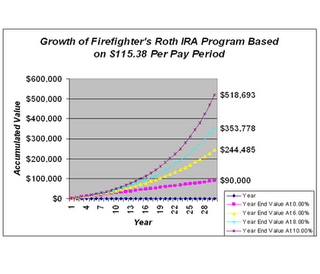
It's beyond the scope of this post, but suffice to say that it isn't particularly hard to have a passive income of $10,000 per month if you've got 1.25 million dollars to your name.
Cousin P is on his way. As young as you are, all you need to do is make a couple of smart decisions and you can seriously set yourself up to be in a good situation.
I had a job from starting as a 10 year old throwing newspapers. If I had saved half of my money and put it in an interest bearing account, then when Roth IRA's became available put my money into one.... (Jay shakes his head slowly)
But do you know what I did with that money? I used to finish my paper route and ride my bike over to the grocery store and buy an ice cream cone. Then I rode over to the gas station and threw quarters down a video game machine playing 'Teenage Mutant Ninja Turtles' so I could put my name in 1st place. They re-set it every day so I always wanted to go back to show the world who was the bomb diggity at TMNT.
What was I thinking? I was thinking the same thing every 10 or 11 year old kid would have been thinking. "Hey, I could really use an ice cream cone right now." "Better head over and show who's boss at the video arcade."
Lame!
The race does not always go to the swift. Don't do it like I did it. That was stupid. Set yourself up for success.
Later,
Jay

